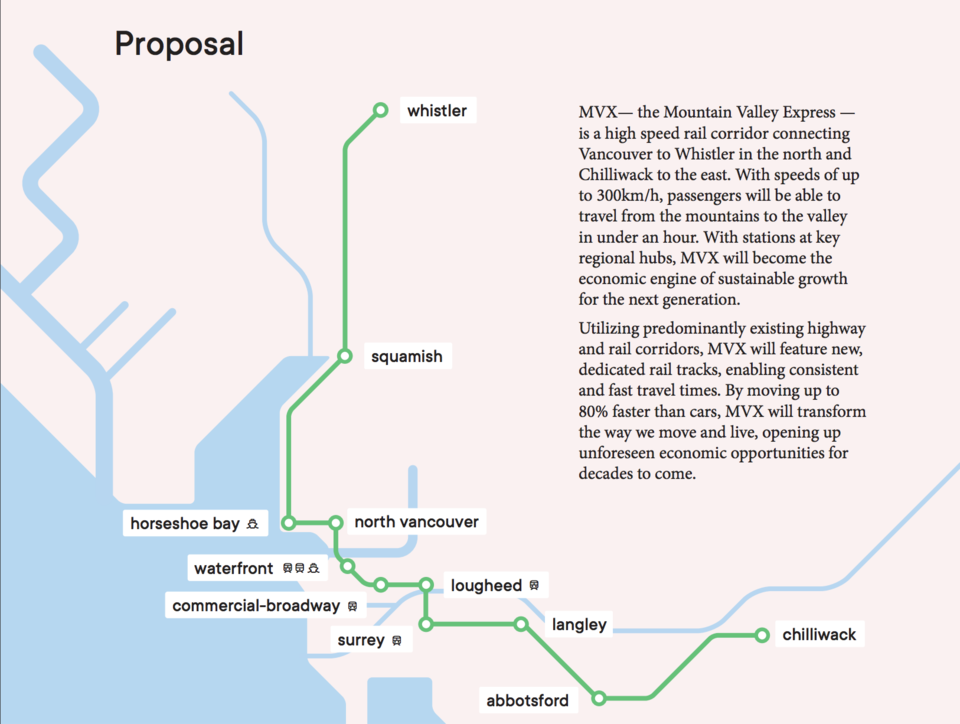A high-speed rail line that would take passengers from Whistler to Downtown Vancouver in just over half an hour could revolutionize travel in the Sea to Sky.
Called the Mountain Valley Express (MVX), the envisioned high-speed rail corridor would connect Vancouver to Whistler in the north and Chilliwack to the east. With speeds of up to 300 kilometres an hour, proponents say the MVX could carry up to 15,300 passengers per hour and would cut down on travel time by up to 80 per cent, compared to driving by car.
“We have a choice. Do we continue business as usual, or chart a new path to prosperity, a path that also considers the large looming climate emergency?” said PhD candidate and urban planner Alex Gaio in a release.
A recent masters graduate of Sweden’s KTH Royal Institute of Technology, Gaio is heading the so-called MVX Collective, which is pushing the province to launch a feasibility study on the rail line.
“As we think about the COVID-19 recovery, we need to think big,” says Langley Councillor Nathan Pachal in the release. “B.C. is a province of builders. Let’s build for the future.”
Utilizing predominantly existing highway and rail corridors, MVX is planned to feature new, dedicated rail tracks that are forecast to accommodate 97,000 trips per day, removing an estimated 20 per cent of drivers off of congested highways.
“Climate change requires us to rethink how we live, work, and play,” the report read. “We can no longer continue investing billions in public funds towards highways, which fuel rising congestion, greenhouse gas emissions, and expensive sprawl that eat away our farmland and forests. We can, and we must, do things differently.”
MVX draws on a similar concept being considered for the Pacific Northwest that would link Vancouver to Seattle and Portland. That proposed $50-billion bullet train is now being studied by officials in B.C., Washington state, and Oregon.
Rail has been put forth as a potential travel alternative to Whistler since the commuter train to the resort was discontinued in the 2000s. The hang-up there has usually hinged on cost, and at an estimated price tag of between $7 billion and $16 billion, MVX will would come at a steep cost to taxpayers—although proponents are recommending that revenues from B.C.’s carbon tax be used to fund a portion of the project, along with any available federal monies and land-value capture revenue from around rail stations. Without MVX, proponents said there would be increased pressure to expand and upgrade both Highway 99 and Highway 1, which, according to their estimates, would cost between 30- to 70-per-cent more than building the MVX line.
“With the most significant travel time savings of any transportation projects built in recent history, the economic returns for MVX will be felt for a generation,” the report stated, noting the project would create between $47 billion to $61 billion in “transportation benefits” over 30 years.
With Greyhound no longer servicing B.C., and increased congestion on Highway 99, there’s no denying the immense impact the rail line could have on travel and tourism in the Sea to Sky. Pre-COVID at least, resort stakeholders were already wrestling with so-called overtourism, with Whistler attracting close to 3 million visitors a year.
“Anchored by Whistler Blackcomb … the Sea to Sky has seen incredible economic growth and tourism demand since the 2010 Olympics,” the report read. “However, this has also brought unprecedented highway congestion, creating unreliable travel times and unanticipated pressures on natural areas. Continued sustainable development is only possible with the alternative, fast transportation connection enabled by MVX.”
With just 31 minutes from Whistler to Waterfront station, the MVX could also usher in a new wave of commuting workers, furthering Whistler’s appeal as a potential bedroom community to Vancouver. Local realtors have already noted growing interest from workers looking to the resort as a viable place to work remotely, as COVID has made outdoor-oriented destinations more appealing tol city dwellers.
The MVX calls for 11 rail stations, located at Whistler, Squamish, Horseshoe Bay, North Vancouver, Waterfront, Commercial-Broadway, Lougheed, Surrey, Langley, Abbotsford and Chilliwack.
The project would be a major job boost for the province as well, with proponents predicting the creation of 460,000 to 1 million jobs over a 30-year period.
To view the full report, visit http://mvx.vision.
Pique will have more on this project and what it could mean for Whistler next week.




